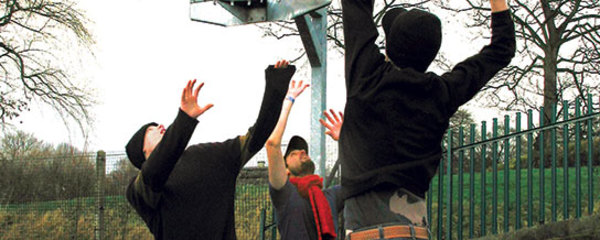Hood Stays Afloat
“Hood is like a ship always tempted to push how far it can safely venture; […]
Hood Stays Afloat
“Hood is like a ship always tempted to push how far it can safely venture; […]

“Hood is like a ship always tempted to push how far it can safely venture; at times it felt like it was sinking, but the water’s frozen around it and stopped the boat,” laughs Chris Adams of Leeds-based psyche mâché artists Hood, as he metaphorically describes his group’s dynamic. “We started as a speedboat two years ago [following 2001’s critically successful Cold House], then went round the various harbors and took on water; but we’ve been in for repairs and are seaworthy again.”
Together for 14 years, Hood’s latest cargo is Outside Closer. Adams, his brother Richard, and collaborator Stephen Royle form Hood’s nucleus, while a host of revolving crewmembers have contributed across nine albums and 17 singles.
Hood’s last full-length, Cold House, was duskadelic, glistening glitch featuring micromanaged pastoral minutiae and stippled hip-hop from Doseone and Why? of cLOUDDEAD. On Outside Closer–the more instrumentally sumptuous follow-up–there are still masticated melodies and an underlying lo-fi twitter but no outside collective’s resources, which proves fortuitous. The band was forced to chart new seas, taking all production onto their own shoulders; they recorded and premixed at home before utilizing a friend’s studio for mastering and additional instrumentation. While thus entrenched, Hood faced a consuming and sometimes compromising process.
“We didn’t want [to go into] full-on philharmonic orchestra territory, but we wanted more real instruments, atmospheric things,” recalls Adams. “We didn’t have the resources to realize all our ambitions so, over time, we made judgment calls. What happened is we really wanted to make something poppy and brash. But slowly you realize you don’t personally listen to in-your-face records all the way through. And yet we didn’t want an album that was stripped back. So we met the ideas halfway.” The resulting mood and mode of the recordings befits the record’s disconnected title, and the vocal-laden music is Hood’s most approachable yet–though it’s still far from immediate.
“Though we’re widely considered melancholy, I don’t see our music as inherently sad,” observes Adams. “There’s a longing, but I think it’s inherently hopeful, offered as an eddy from horrid bustle. It’s about acknowledging the little disappointments while not dwelling on them or being despondent. With both our production reach and creative outlook, there’s that push to see what’s round the corner. It’s a total learning curve, basically.”

